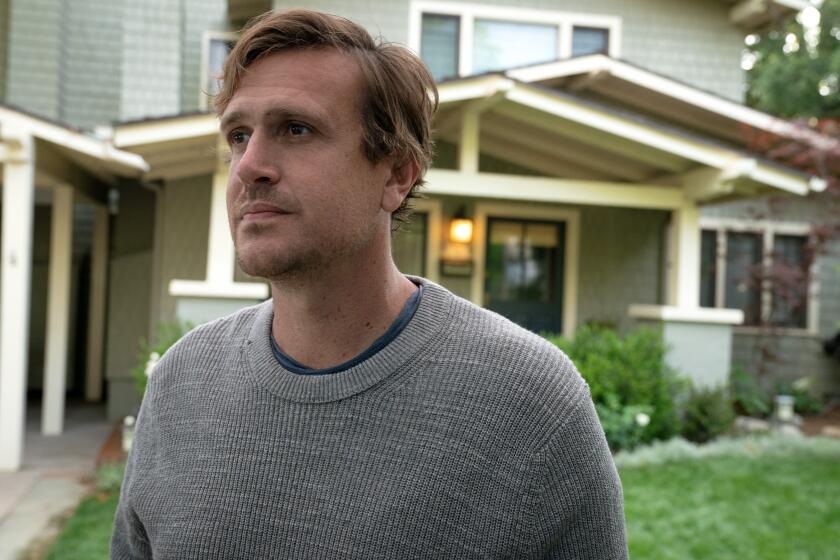Boundaries on ‘Shrinking’ are questionable, but the co-creator says there will be consequences
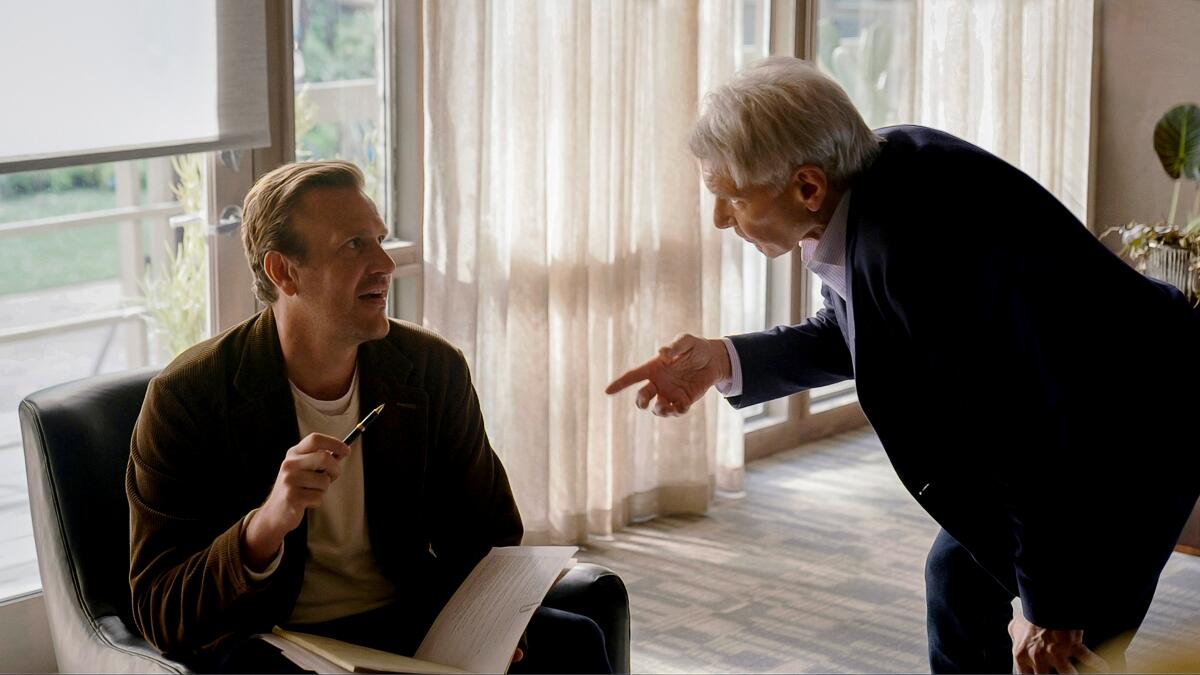
The dirty secret of therapy is that therapists often need their own help coping with life’s challenges. And the Apple TV+ comedy series “Shrinking” has used that idea as a launching point.
The series stars Jason Segel as Jimmy, a grieving widower and therapist who is taking an unconventional approach with his clients and those in his orbit, including his grumpy mentor, Paul, played by Harrison Ford. Segel co-created the series with Bill Lawrence and Brett Goldstein, who collaborated on “Ted Lasso.” The cast includes Jessica Williams (Gaby), Christa Miller (Liz), Lukita Maxwell (Alice), Michael Urie (Brian), Luke Tennie (Sean) and Ted McGinley (Derek).
In much of the first episode, we see Jimmy becoming far too involved in the personal lives of his clients, leading to a breakdown of boundaries. After spending his days listening to his patients unload about their toxic spouses, their compulsions and their dating troubles, he grows increasingly frustrated by their lack of action — or, as Paul calls it, “compassion fatigue.” Jimmy, whose life is just as wayward, leans into a new tactic, pushing his patients to change and to accelerate their breakthroughs, while attempting to find his own breakthrough with the help of his family and friends.
“I don’t think we’re doing a disservice to therapists by humanizing them,” says Lawrence. “And making people realize that when you leave their office, they got to deal with the same s—.”
The series has already been renewed for a second season — and after the unexpected events in the closing minutes of the season finale, released on Friday, viewers will probably be left speechless until then.
During a break from work at the Warner Bros. lot, Lawrence hopped on a video call to talk about the season’s shocking final moments, which showcase Ford’s comedic brilliance, with the help of Fun Dip and music by ’90s rockers Sugar Ray (massive water bottles also have their TV moment). The conversation has been condensed and edited for clarity.
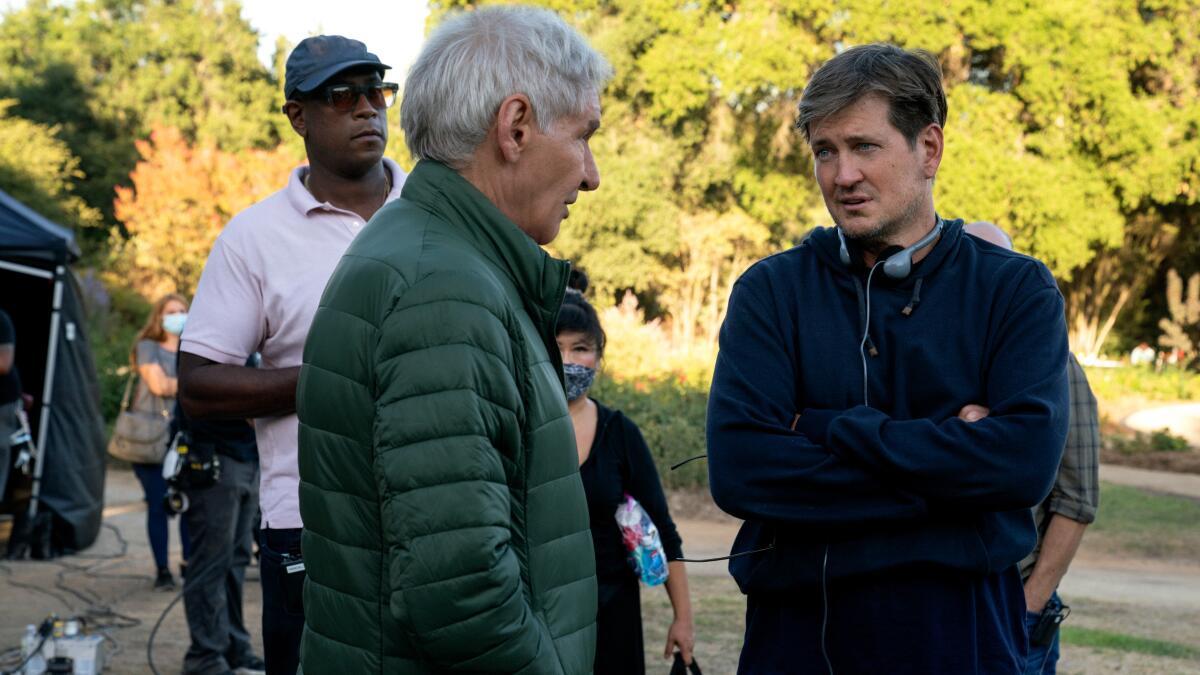
Jason Segel co-created and stars as a grief-stricken therapist in an Apple TV+ comedy, co-starring Harrison Ford and Jessica Williams.
I feel like every other day on social media, I see that a person I’m following has started watching “Shrinking” and is loving it. What has it been like to witness the word-of-mouth spread and how viewers have responded to it?
All right, I’m old. This has been a very weird new learning experience for me — first on “Ted Lasso,” then this. It’s very hard to live in a world now where you not only don’t know even theoretically how shows work, but these places don’t share any of their metrics with you. And so the only thing that you have left, and it’s kind of cool, is social media. We can sense it kind of landing with a bunch of people. We knew we had a passionate fan base at first, but now in a very cool way, in our regular lives, we can feel it kind of expanding a bit. It’s very exciting. And we really liked the show and are proud of it, and not just because of the show itself, but because we also feel like we’re curating one of Harrison Ford’s last big kind of [roles].
I want to dive into the finale right away. I was shocked when Grace (Heidi Gardner), who is one of Jimmy’s patients, actually follows through with her fantasy of pushing her emotionally abusive husband off the edge of the cliff while hiking. It gives new meaning to ”cliffhanger.” Did you always intend for that to be the ending?
What’s really fascinating about the way people consume television now, especially in streaming, is you see real-time reactions. And one of the cool things about the storytelling is, from the start, we knew that what we were having Jimmy do — because we did the research, and we did the interviews — what we’re having Jimmy do with patients has to have consequences because there’s different ethical issues. And what’s so fascinating for me — I always read all this [Twitter] stuff, and the writers have to hold me back because I want to be a spoiler guy and respond, “Do you not think that we interviewed 100 shrinks? And that we know that these things are unethical?” The other night, someone was like, “A neurologist isn’t allowed to sleep with their patient?”
Yes, the boundaries are definitely out the door.
Yeah, it’s like, “Really? I wasn’t aware of that.” I wonder if that will ever come up again? To me, what’s weird is people didn’t used to get that information, of their frustration, to you right away. And so I’m always tempted to go, “Hey, you’re smart. Hold your breath for a second.” So yes, we knew from the start that there were going to be consequences to this type of behavior. We always knew that this was the plan.
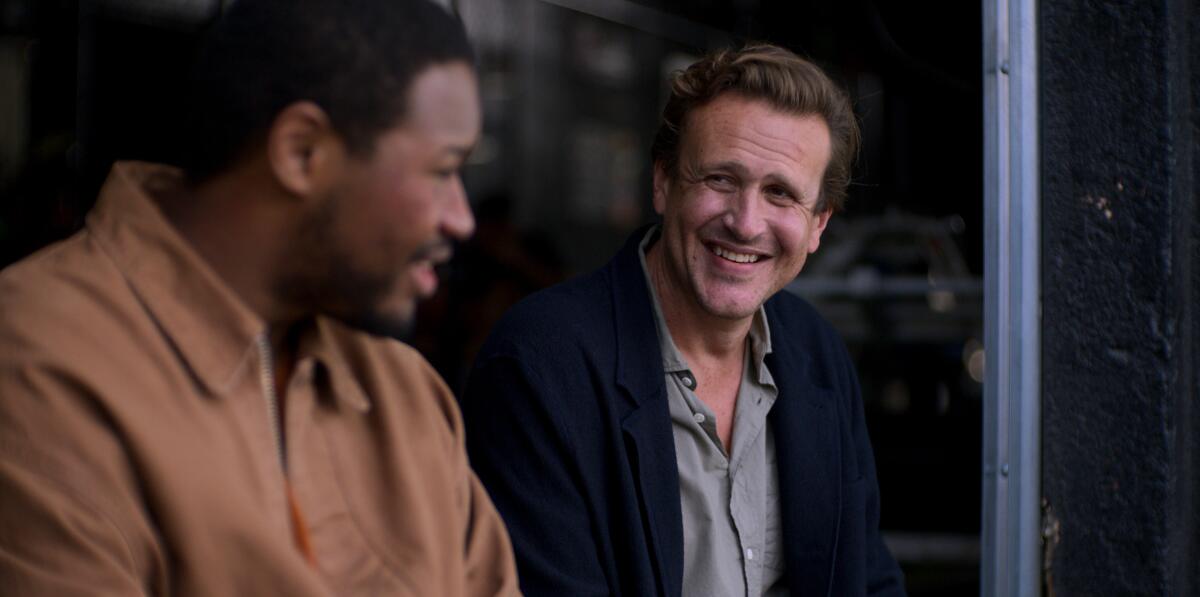
And how are you thinking about the Jimmy and Gaby situation at this stage? Because as viewers, we’re sort of preconditioned to think in terms of will they/won’t they or who will be the one true pairing. Do you think of it in those terms?
I don’t. So, in a good way, the new [television] landscape, you pitch three-season stories — we pitched this show as having the first year be about grief, the second year is about forgiveness, and the third year is about moving forward. And I can tell you — and the writers would say I’m not allowed to — if Jimmy and Gaby is a long-term thing, and I can tell you how all these things play out, because it’s part of the new world order when you pitch the stories. It’s not to say that they might not change. We know how the Jimmy and Gaby story goes. And I don’t think it will go the path that people expect it to.
How do you see Paul living with Parkinson’s evolving as the series moves into Season 2?
That one’s dicier because we have to honor the people living with it. My grandfather had Parkinson’s. My father has Lewy body, which is an extension of Parkinson’s mixed with dementia — it sucks. And my first big break was [“Spin City”] with Michael J. Fox. And Mike, more than anybody in my life, meets this condition with such courage and such humor. Brett’s father also has Parkinson’s. We have to honor the progression. So we have to keep it funny, but for Brett and I, it really matters to us to authentically show what it means to navigate that condition nowadays, and it’s not one that goes away.
Processing grief is at the heart of the series. And if you’ve lived long enough, you’ve loved and lost someone or have felt someone slipping away. There are a number of small, specific moments throughout the season that felt pulled from my life. An example is like when Jimmy tells Brian the reason he stepped away from the friendship was because he couldn’t be miserable around him.
Brett and I, when we were talking about doing the show — and unfortunately on the heels of a pandemic and the way the world is right now — everybody in our world is one step removed from dealing with heavy grief. Look, my dad’s struggling, and it is a day-to-day thing. It encompasses a lot of my personal life because I’m very close with him, but we meet it with humor. And so the fact that you said that it feels familiar means so much to me. A lot of the work in the writers room is having conversations the same way you and I are about stuff that is, unfortunately, in everybody’s lap. We haven’t faked one moment yet. Everything you would point to is a specific conversation from one of the writer’s lives, which is a drag, but it is universal.
Helping to balance the heaviness with moments of levity is this cast. Jessica is amazing. Michael’s amazing, Christa is amazing. I love Ted, Luke and Lukita. They each shine throughout the series. But I had moments where I had to keep reminding myself that I was indeed watching Harrison Ford on this show. His line delivery is so, so good. But he would seem like such pie-in-the-sky casting. How did it happen?
My network TV upbringing is you watch the pilot, whichever cast members are working, you lean into the curve. And what’s tricky about this show is everybody is crushing it. I don’t think we’ve announced it yet, but I’ll say we are making Ted McGinley a regular on the show because he’s just like the janitor character on “Scrubs.” And I’ll repeat something Harrison said: “You know, this show wouldn’t work, because of the stories you’re telling the first year, if the two kids weren’t great.” Lukita and Luke are hanging with heavyweights.
All those things aside, Jason, Brett and I were talking. We didn’t know Harrison very well. He lives up my street. But when we were talking about the character, we said, “Hey, it’s gotta be a blue-collar dude that you still can believe is a shrink, and he’s got to be able to turn jokes.” And we jokingly say, “What about Harrison Ford?” I asked [Harrison], and he read the script. I wasn’t ready for anything other than a “no,” and he was like, “Hey, man, I really loved the first script. I’m not in the first one a lot, would I be in the second one more?” And I was like, “You’d be in the second one as much as you want.”
This is what we knew about Harrison. We said, if we write him really stoic and grumpy and acerbic, it’ll work. And we did that the first two episodes. But when we were working, we were like, “Oh, wait, this dude’s a gamer. He doesn’t just have to be someone who the comedy happens around. He can bring the comedy.” And the second we started saying things like, “Hey, will you sing in the car with Jessica? And will you scare a peacock?,” it was over. And by the way, I have footage I could sell — it became very important to him when we were shooting a scene about Fun Dip that he always eat it. I have footage of him eating five straight packs of Fun Dip. And I was like, “Harrison, what are you doing, man? You’re gonna have to sleep tonight, dude, you’re 80 years old. Stop pounding Fun Dip.” And he is such a gamer and is so funny. And it’s a career highlight for me not only to watch him work, but I can see how much fun he’s having.
I didn’t know how much I needed to see Harrison Ford singing Sugar Ray’s “Every Morning.” And I saw an interview where Jessica said she provided a number of song options for that scene, including Britney Spears’ “(You Drive Me) Crazy,” Barenaked Ladies’ “One Week” and Crazy Town’s “Butterfly,” but he landed on Sugar Ray, right?
Jessica knows all the words to like 25 one-hit-wonder songs. It’s bananas. All of them. We just said, you list them and we’ll shoot the scenes to them. The last thing Harrison said to me about that song was he liked that one more than a different one we picked, but he’s like, “I might just come in and bop around to it in the car and dance, but I’ll enjoy it.” And then he showed up knowing every line, and I lost my mind. I literally said to him, “Harrison, it’s very tempting to do this every week, have you in a car singing a different song.”
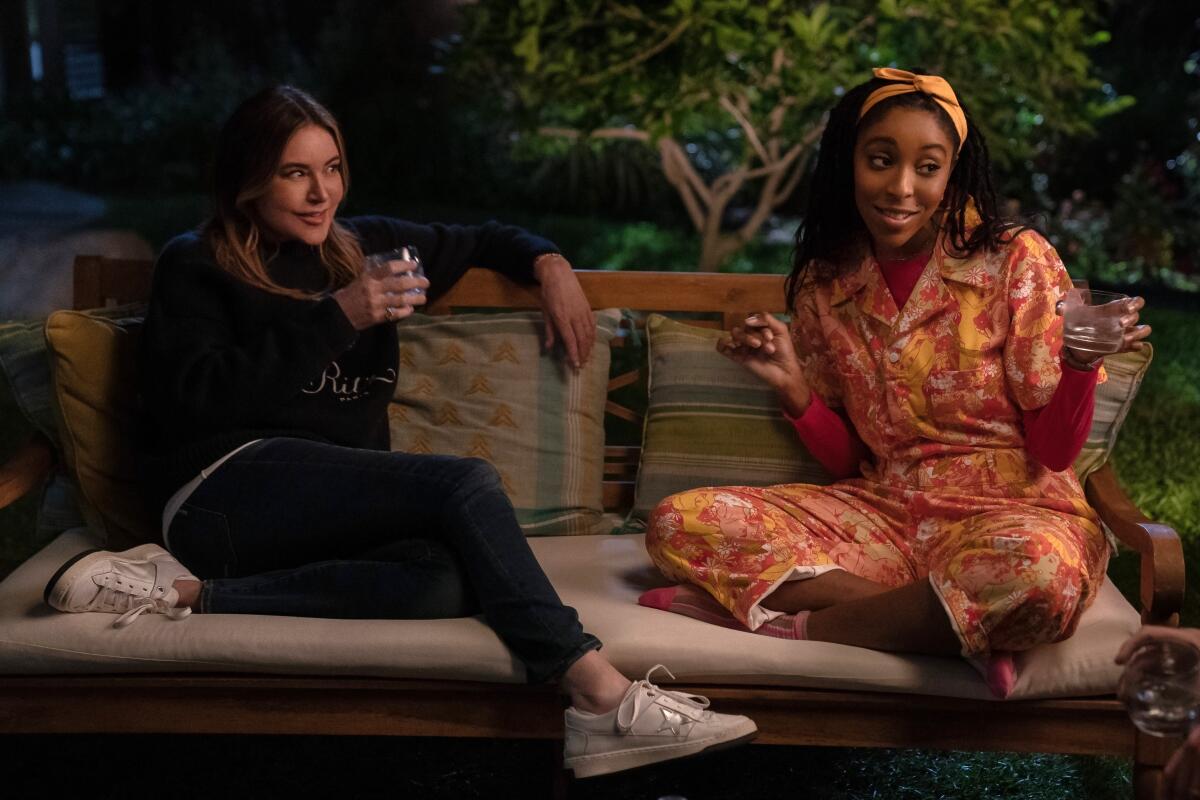
That’s one of the fun aspects of the show, is how dynamic the various pairings are onscreen. It’s such a delight to see scenes like that, between Harrison and Jessica. Which one surprised you the most in terms of how unexpected yet effective it became to the story?
We were very happy that Lukita and Harrison were so funny because we didn’t know how Harrison would be playing comedy. I could watch those two sit on a bench and goof around.
But the one dynamic of the show that actually changed was we did not envision Christa and Jessica’s characters building a friendship. And then we watched them when they go kind of toe-to-toe in the second or third episode, and there’s a real chemistry there. It’s playing a major part in the [next season] in the same way.
You’ve talked before about how therapists tend to exist on TV as a way to expand the principal character’s personality. How did having therapy baked into the premise push that further for you?
I’ve reached the place where, because I’m therapied up myself and I have friends that are therapists, they are just as f— up as the rest of us, with an added level of self-awareness of the mistakes they’re making. And I find it to be so interesting that you’ve actually studied and are an expert in the field of the very thing that you can’t necessarily snap your fingers and fix yourself.
But it’s so funny because I’m on social media, someone’s like, “I can’t believe he [Jimmy] takes this kid [Sean] to MMA.” But [that idea is] straight from a therapist that did it. It was featured in an HBO “Real Sports” segment. The dude was dealing with PTSD; the only difference is the patients had to volunteer. But it’s so interesting, the very same thing that you’ll sometimes have people go, “I can’t believe he’s doing this,” doctors are doing this stuff; they’re trying. It’s always under the umbrella of trying to help. Some are misguided, some aren’t. Point being, it’s a super-duper rich story generator.
You’re a veteran of the industry. And we’re coming up in a critical moment where Hollywood is bracing for a possible writer’s strike. I know you experienced the last one. But some of the writers on “Shrinking” or “Ted Lasso” likely didn’t. And I’m curious, what’s the temperature in the room? Have you had to address concerns or offer any advice?
Yeah. I don’t think there’s any advice. I talk a lot about what the last one was like but with no agenda. I think everybody’s very optimistic, which is good. I don’t know what’s gonna happen. And if I ever get give sage advice, it’s just to say, “Hey, don’t assign human feelings to giant corporations because their job is to be honest to their shareholders and all that stuff. So know that you have to have resolve as these things play out.” I think that the one thing I can tell you that I see among the writing staffs is, especially young people, a strong sense of resolve.
Are you close to finishing the second season? Do you feel like you have to get things locked should a strike happen?
That’s not the best way to operate. The joke that circles back to this is — to annoy my friends for 25 years, when I would get fired or when something would go bad, I would always say, “Everything goes my way.” And I used to torture people with it. And what I meant by that is like, I’m really just trying to put it out there in the universe and hope that it goes my way. To expect the worst is a ridiculously dysfunctional way to go through anything, much less a work life. So rather than rushing or being frantic, we’re doing the gig, we’re crossing our fingers that things go great. If they don’t, we’ll figure out what to do, and we’ll be in the same burden as everybody else and deal with it as it falls. But we’re not doing some crazy hustle to go, “And we’re done!”
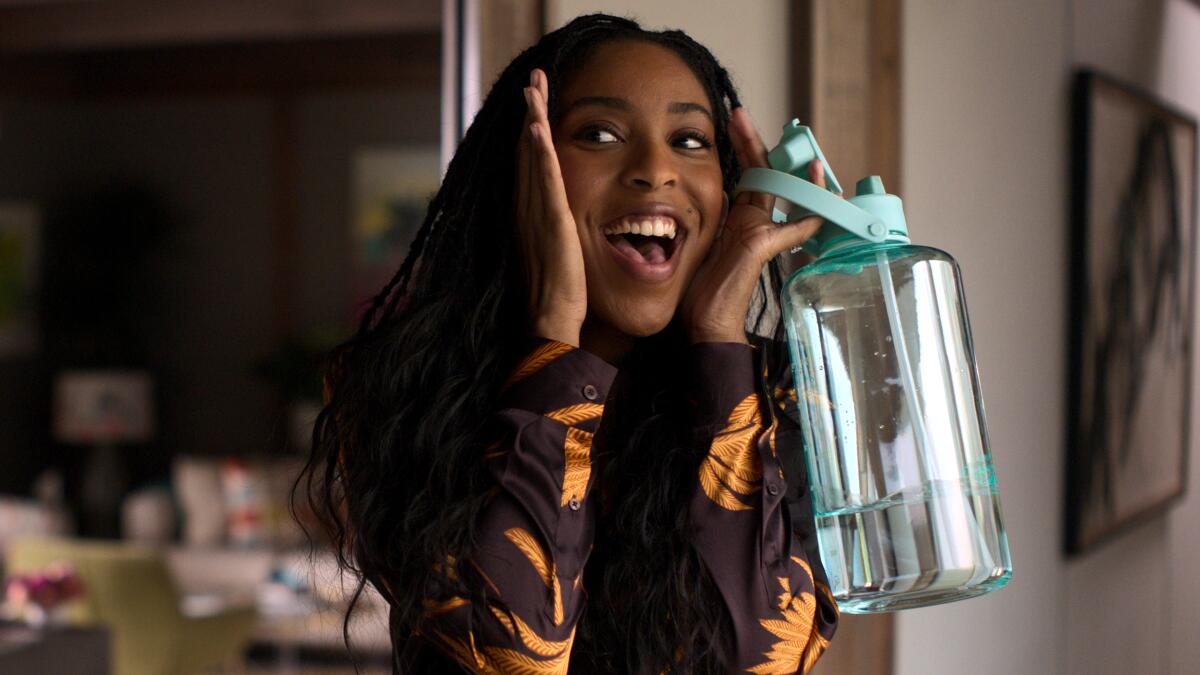
Before I let you go, I want to talk about the unlikeliest breakout stars of “Shrinking,” which were Gaby and Paul’s water bottles. Did you expect it to become this ongoing bit, and how many water bottle options did you go through?
We got obsessive about it. And writers rooms, they’re full of room bits. And one of the [executive producers] on the show, Annie Mebane, has a water bottle that, when she put it on the table, I couldn’t really see her around it. It’s like a trash can. And she was always like, “Yeah, you got to stay hydrated.” And we’d be like, “Yeah, but that’s insane. I mean, you must pee 75 times a day.” And it just became part of the show. Jessica immediately was like, “I’m carrying that water bottle everywhere,” and you sometimes even spot it in scenes that you don’t know it’s in. And Harrison was like, “Well, once I get that water bottle, that’s going everywhere with me.” That’s the attention to detail. That would never happen on a network show.
‘Shrinking’
Where: Apple TV+
When: Anytime
Rating: TV-MA (may be unsuitable for children under the age of 17)
More to Read
The complete guide to home viewing
Get Screen Gab for everything about the TV shows and streaming movies everyone’s talking about.
You may occasionally receive promotional content from the Los Angeles Times.
